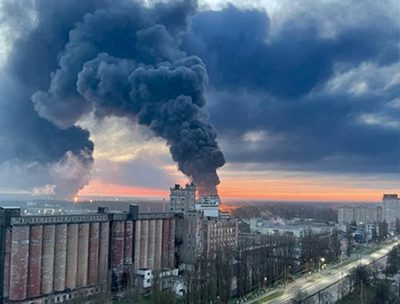Ukrainian TB2 Bayraktar Drone ‘Bombed Oil Depots Deep Inside Russia’
Source says Turkish-made armed drone hit the fuel storages in Russia's Bryansk, breaching advanced air defences

All Global Research articles can be read in 51 languages by activating the “Translate Website” drop down menu on the top banner of our home page (Desktop version).
To receive Global Research’s Daily Newsletter (selected articles), click here.
Visit and follow us on Instagram, Twitter and Facebook. Feel free to repost and share widely Global Research articles.
***
A Turkish-supplied armed drone is believed to have been used by Ukraine to hit two oil depots well inside Russian territory on Monday, bringing the war behind the frontlines and embarrassing Russia’s air defences.
A person familiar with the incident told Middle East Eye that a Turkish-made TB2 Bayraktar was used in the attack that took place in Bryansk, a small city 370km south of Moscow.
Though Ukraine is believed to have been behind a similar helicopter attack on 1 April on a fuel depot in Belgorod, this latest raid was more significant because it succeeded in breaching Russia’s air defences and flying at least 150km deep into Russian territory.
Russian state media said a fire broke out at a civilian oil depot in Bryansk holding 10,000 tonnes of fuel. It reported a second fire at a military fuel depot holding 5,000 tonnes. The city is considered a logistics base for the Russian military’s war effort in Ukraine.
#Russia: Early today, 2 oil storage depots (Civil & Military) were hit by explosions & subsequent large fires in #Bryansk. Some fires continue 12+ hours later.
Whilst officially unconfirmed, info we have reliably received states that they were caused by UA TB-2 drone strikes. pic.twitter.com/o3F70FN0F5
— 🇺🇦 Ukraine Weapons Tracker (@UAWeapons) April 25, 2022
Stijn Mitzer, an arms expert who runs popular defence blog Oryx, told MEE that a TB2 Bayraktar’s use in the attack was plausible, despite a lack of footage released by Ukrainians.
“The reason that you don’t see footage is because Russia is still firing missiles at the bases from which the TB2s operate,” he said. “If they would post images, Russia would feel pressured to retaliate even harder.”
Russian reports indicated that Ukraine lost a TB2 the same day in Russia’s Kursk oblast after the fuel bombings in Bryansk, possibly while en route back to base.
“This raid was conducted deep into Russian airspace,” Mitzer said, adding that it was comparable to “the daring raids during World War II, infiltrating deep into enemy territory during the night.”
According to Mitzer, even if Ukraine loses a TB2, as they have now, it’s more than worth the effort in terms of material and morale.
The source familiar with the Ukrainian raid also confirmed that a TB2 Bayraktar played a role in sinking the guided-missile carrier Moskva, the flagship of Russia’s Black Sea Fleet, on 14 April.
“Ukraine’s anti-ship missile Neptune has some guiding issues. A TB2 Bayraktar must have resolved it by pinpointing the ship,” the source said.
Ukraine and Turkey have close defence industry cooperation, a relationship that has flourished in recent years. The TB2’s producer Baykar, which has close ties to Turkish President Recep Tayyip Erdogan’s family, was building a plant in Ukraine before the war.
Ukrainian companies also produce the TB2’s engines, and Turkey has sold more than 20 Bayraktars to Kyiv over the course of the past two years.
Frequent flights between Turkey and Poland over the last two months indicate that Turkey has continued to deliver TB2s and its MAM-L ammunition to Kyiv. Some experts believe six or 12 more TB2 have been delivered as agreed before the war.
TB2s have a proven track record of success against several adversaries in conflicts in Libya, Syria and Nagorno-Karabakh, yet they have never faced an army with sophisticated electronic warfare capabilities and state-of-the-art air defence systems until the Russian invasion in Ukraine.
So far they have proved themselves effective in combatting Russian troops deployed deep inside Ukrainian territory, even though Russia’s units have had advanced weaponry and air defence systems.
“Although we don’t have enough input to definitely assess the platform and munitions of choice, Ukraine hitting a critical logistics point in Russian territory is militarily critical,” Can Kasapoglu, director of defence at Istanbul-based think tank EDAM, told MEE.
“We saw that in Belgorod before, but this incident is definitely more serious. If confirmed as a Ukrainian strike, the attack would mark yet another blow to the Russian campaign.”
*
Note to readers: Please click the share buttons above or below. Follow us on Instagram, Twitter and Facebook. Feel free to repost and share widely Global Research articles.
Featured image: A screengrab from footage showing the fuel depot fire in Bryansk, Russia on 25 April (social media via MEE)

